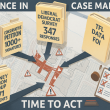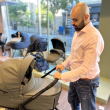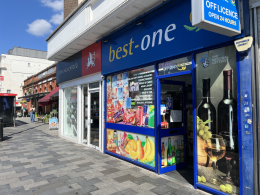After five years building an online baby business and surviving a renovation accident that nearly proved fatal, Shehzad has opened Tiny Feet on Putney High Street – bringing specialist baby retail back to SW15 with brands you simply cannot find anywhere else in London.
The former Barclays bank premises reopened yesterday as South West London’s most comprehensive baby store, drawing curious locals and parents from across the capital seeking everything from Mercedes-Benz prams to Aston Martin pushchairs in what Shehzad describes as a “desert” for specialist baby retail in the modern retail landscape.
“There are only one or two baby stores left in London,” he explains. “People travel from East London, anywhere south of the river, because I’m the only one in London selling certain Italian brands like Inglesina. I’m the only one within a 60-mile radius selling Mercedes-Benz prams.”
Shehzad’s entrepreneurial journey began 15 years ago as an 18-year-old manager in John Lewis Oxford Street’s nursery department, watching wealthy customers drop “extortionate amounts of money” on their first children. The store’s exclusivity is no accident: his business model, conceived during university-era shifts at John Lewis, centres on offering what nobody else can.
“Back when I was 18, Bugaboo was one of the first doing changeable colours on pushchairs. I thought, why not offer completely customisable fabrics? If you send us a fabric that you like – butterfly patterns, florals, whatever – we’ll get it treated, made to fit your pram perfectly.”

From concept to reality: A 15-year journey
The path from student manager to High Street entrepreneur took unexpected turns. “I didn’t set it up when I left university – I was 18, I wanted to enjoy life,” he laughs. “My career went a different way for 15, 16, 17 years. But when I turned 27, 28, I had time on my hands, being unattached, not married, no kids, and a little bit of money saved up. I thought, if I’m going to do this, why not now?”
He’s no longer single. His wife, a lawyer, and his young daughter – in an excellent pram – are both there on opening day providing support. But his timing proved prescient.
“When I was 18, internet shopping wasn’t a thing. Now that’s exactly the challenge high street stores face.”
The baby retail sector has been particularly hit by online competition. “That’s why Mothercare went many years ago – they were huge but couldn’t compete with online discounting.”
But Shazad identified a crucial weakness in the online model: baby equipment isn’t impulse buying. “A customer comes into my store when they’re expecting, but they don’t need a pram that day. They want to go home, discuss it with their partner, think about it, then come back in a couple of weeks. I’ve had people come in today who aren’t due until January, February.”
This purchasing pattern creates both challenge and opportunity. “There’s a likelihood they might wait for Black Friday, go online. That’s the problem for everyone. But the flip side is that there are so few physical baby stores left that people will travel significant distances to see products in person.”
Plus, he notes, “you can’t customise online. You can’t feel fabrics, test how prams push, see the quality differences. That’s why people travel to us.”

The renovation nightmare: “I missed my spine by half a centimetre.”
What should have been a straightforward shop conversion nearly became a tragedy. The former Barclays premises on Putney High Street came with bank-level security infrastructure: double plasterboard over 18mm chipboard, reinforced with countless nails rather than screws. “I was thinking of doing the DIY myself – I’m a DIY enthusiast, I can do plumbing and all that stuff,” Shehzad recalls.
Using a powerful angle grinder, he systematically cut through dozens of four-and-a-half-metre wooden stud walls. “Got through about 40 beams, got down to the last two or three. They were small – I could have used a normal jigsaw, but I had the machine in my hand, thought let me just power through them.”
The second-to-last beam contained a hidden nail.
“The machine ricocheted off the nail, flew out – luckily missed my face, went over my head. But because it was electric, not battery, the power of it pulled me off the ladder while I’m still holding it. It hits the glass, ricochets off that straight into the back of my neck. Tears a chunk out of my neck.”
The horror wasn’t over. “As I fall on the floor, it runs up the side of my stomach. Luckily it had chewed up enough of my neck, enough fabric, and hitting the concrete had slowed it down. Otherwise it would have been like Saw 5 or something.”
Today, a dramatic scar runs down Shehzad’s neck – visible proof of his commitment to the project. “I missed my spine by about half a centimetre, missed my arteries by a bit. When you hire a builder and he misses electrical cables, you say ‘good job.’ Well, I missed my spine and arteries – good job!”
The immediate aftermath reveals his character. Despite massive blood loss, his first thoughts weren’t panic but logistics: “I had a night shift that evening – I needed to call my manager. Egg contractors were due in three days – that wasn’t happening. All these things kept me from going into shock.”
His friend who was helping him set up ran out onto Putney High Street shouting “Someone help!” while Shehzad applied his workplace health and safety training: “I laid myself down near the window, propped my legs up to get blood to the heart. I knew what to do.”
We ask to see a picture of the damage to his neck he has on his phone. “I hope you’re not squeamish,” he notes. We thought it might be fun to post it alongside this story, but rapidly decide against it.

High Street revival: “People are excited about business coming back”
The accident delayed the shop opening, but his commitment to Putney High Street is unwavering. His location choice reflects both pragmatism and optimism about SW15’s retail future.
“In central London, there aren’t many families, and those starting families are in small one-bedroom apartments without space for all the baby equipment you need. Here you’ve got Wandsworth, Putney leading towards Wimbledon, still close enough to Hammersmith, Fulham, Chelsea, Brentford and Chiswick across the river. Perfect for families and growing families.”
Local reaction has exceeded expectations. “The overall feedback from the local community has been fantastic. The local businesses – TK Maxx, Wagamamas – everyone’s been welcoming. People are just excited that business is coming back to Putney High Street.”
This enthusiasm extends beyond customers to suppliers. “We had brands here for the opening today – Egg, Cybex, others. Their reps were here for hours speaking to customers. A lot of brands are enthusiastic about me being here.”
Shehzad sees Tiny Feet as a catalyst for broader Putney High Street revival. “When people travel to the baby store – which will happen more as word gets out – they might go to Wagamamas after, get coffee down the road. One business can help others.”
But he’s also realistic about challenges. An early encounter with council bureaucracy resulted in a £1,000 fine for temporarily placing renovation rubbish bags outside his own premises while waiting for a skip. “It’s difficult for small businesses with the rents, rates, and rules that are applied.” But he’s in it for the long haul, having signed a five-year lease and hoping to stay for longer. He’s thinking about moving to Putney to be closer to the shop. Plus he and his wife like the neighbourhood.
That commitment extends beyond retail to community integration. “We bought the flooring from Tapi Carpets next door. We’re looking at getting signs and price tags made locally – the owner of Snappy Steps happened to be here with her pram, we swapped numbers. I want to give money back to our neighbours.”

Expansion plans
The store’s phased opening reflects both the renovation challenges and customer psychology. “We’ve opened the ground floor with mainly prams and pushchairs. Upstairs – clothing, toys, furniture – opens in about three weeks. It’s almost a soft launch to get people talking about us, so when they’re ready to purchase, upstairs is open and they can see everything.”
Visual merchandising will be crucial, and Shehzad’s creativity is already evident in his centerpiece innovation: a custom-built test track running through the store’s center. The track features different surface textures – smooth paving stones, rough gravel, and bark chippings – allowing parents to actually test how prams handle various terrains.
“I’ve been a bit creative with the test track that I’ve built,” he explains, demonstrating how different pushchairs respond to the surfaces. “You can’t get this experience online – feeling how a pram pushes on gravel versus smooth pavement, testing the suspension, seeing how it handles kerbs. This is exactly why people need to visit physical stores.”
The front window display will showcase furniture next week. “Once upstairs opens, window furniture goes upstairs and we’ll have pram displays rotating through the test track. We’ll be creative with how we show everything.”
“I’ve put my blood, sweat and tears into this place”
Standing in his renovated store on Putney High Street, the scar down his neck a permanent reminder of his commitment, Shehzad reflects on the journey with characteristic directness. “You could literally say I’ve put my blood, sweat and tears into this place.”
The investment – financial, physical, and emotional – represents more than business expansion. “I’d saved nearly £15,000-18,000 doing the renovation work myself before the accident. As a small business starting up, that helps enormously.”
But the real investment is in Putney’s future. “I’m here for five and a half years, hopefully longer depending what happens with the landlord. Whether it’s here or somewhere else on the High Street, we want to be part of this community.”
Saturday’s opening drew the couples he expected: expectant parents browsing, planning, beginning relationships that will develop over weeks and months. “A gentleman came in this afternoon, said he’d come back with his partner in the evening – and they did. That’s exactly how this business works.”
For Putney High Street, Tiny Feet represents something increasingly rare: specialist retail that cannot be replicated online, drawing customers from across London to a High Street that has seen too many empty units.
For Shehzad, it represents the realisation of a vision 15 years in the making – and a scar he’ll wear forever as proof that some dreams are worth bleeding for.
Tiny Feet is at 60 Putney High Street and open seven days a week. Services include pram customisation, exclusive brand access and expert consultation. Contact the store directly for current opening hours and to discuss custom fabric services.










